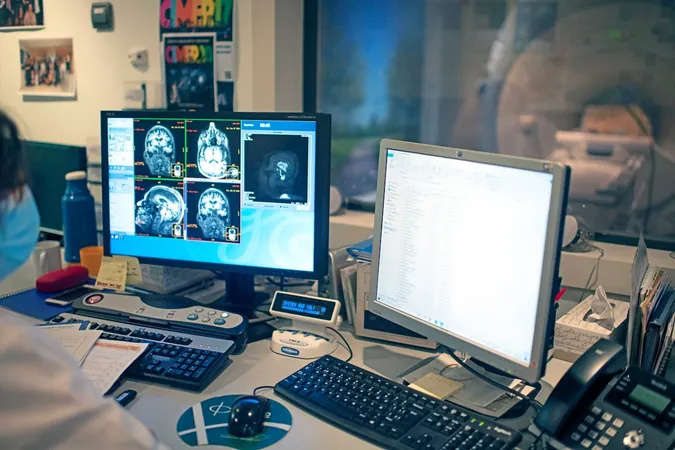
Revolutionary Brain-On-A-Chip Could Transform Alzheimer’s Treatments
2025-01-05
Author: Nur
Imagine a world where a tiny microchip, no larger than a stamp, can unlock the secrets of the human brain and revolutionize the treatment of debilitating neurological disorders like Alzheimer’s. This is no longer a figment of science fiction—it's becoming a reality thanks to groundbreaking research at the International Iberian Nanotechnology Laboratory (INL) in Portugal.
Dr. Raquel Rodrigues, a chemical and biological engineer at INL, leads a pioneering project known as BrainChip4MED. This initiative aims to create a brain-on-a-chip device that could fundamentally change how researchers develop treatments for conditions that affect millions worldwide. Rodrigues states, “The brain is a very complex and puzzling organ. We need advanced tools to monitor cellular activity and interactions on a minute scale to understand how it functions.”
With support from the EU, Rodrigues's team crafted a sophisticated microchip that emulates brain functions. Similar in size to a smartphone chip, this device integrates chemistry, biology, and engineering to function as a micro-biosensor, enabling real-time assessment of potential new treatments.
The uniqueness of this brain-on-a-chip lies in its microfluidic technology. This allows fluids to flow through tiny channels—ranging from tens to hundreds of micrometers—facilitating the testing of small quantities of medication and expediting the research process.
Tackling the Blood-Brain Barrier
A major hurdle in the development of Alzheimer’s drugs is the blood-brain barrier, a protective layer that controls what enters the brain. While this barrier is crucial for safeguarding our central nervous system, it complicates drug delivery for neurological conditions. This is where the brain-on-a-chip shines, simulating this barrier using bioorganic materials much closer to actual human biology.
Dr. Rodrigues emphasizes the significance of their approach, stating, “Other devices typically use synthetic barriers, while we opted for a biological membrane that better mimics the real thing.” This innovation provides researchers with the ability to inject experimental drugs into the chip, observing their effectiveness in penetrating the brain barrier in a controlled environment.
A Game Changer for Treatments
Currently, only four medications are available for Alzheimer’s, and none address its root causes—only alleviating symptoms. Pharmaceutical companies often hesitate to invest in new drugs due to uncertainties regarding their ability to traverse the blood-brain barrier. As Rodrigues highlights, “By providing a reliable testing ground, our chip can make the development process less risky and more efficient.”
This research initiative not only proposes a giant leap in drug development for Alzheimer's but could also reshape how various neurological disorders are tackled. The World Health Organization estimates that up to 165 million people in Europe are living with brain disorders, costing healthcare systems an estimated €800 billion ($820 billion) annually.
Looking Ahead
The INL, co-funded by the national governments of Portugal and Spain, leads Europe in nanomedicine research. While the initial prototype of the chip has been developed, rigorous testing and further refinement are necessary before it can be deemed ready for human use. Dr. Manuel Baños-López, a prominent figure in the Nanomedicine Research Group at INL, notes, “We still have a long road ahead to ensure that this technology can safely be applied in medical settings. However, the potential it holds is incredible.”
As scientists worldwide grapple with the complexities of neurological disorders, this 'brain-on-a-chip' could be the key to unraveling the challenges faced by patients and healthcare providers alike. With the research aimed at combating Alzheimer's disease gaining momentum, hope rises for more effective treatments that could change lives for millions.
This breakthrough technology underscores the urgent need for innovative approaches in neurodegenerative disease research. As Alzheimer’s and related disorders continue to rise with an aging population, advancements like the brain-on-a-chip represent a crucial step toward more successful therapies.
 Brasil (PT)
Brasil (PT)
 Canada (EN)
Canada (EN)
 Chile (ES)
Chile (ES)
 Česko (CS)
Česko (CS)
 대한민국 (KO)
대한민국 (KO)
 España (ES)
España (ES)
 France (FR)
France (FR)
 Hong Kong (EN)
Hong Kong (EN)
 Italia (IT)
Italia (IT)
 日本 (JA)
日本 (JA)
 Magyarország (HU)
Magyarország (HU)
 Norge (NO)
Norge (NO)
 Polska (PL)
Polska (PL)
 Schweiz (DE)
Schweiz (DE)
 Singapore (EN)
Singapore (EN)
 Sverige (SV)
Sverige (SV)
 Suomi (FI)
Suomi (FI)
 Türkiye (TR)
Türkiye (TR)
 الإمارات العربية المتحدة (AR)
الإمارات العربية المتحدة (AR)